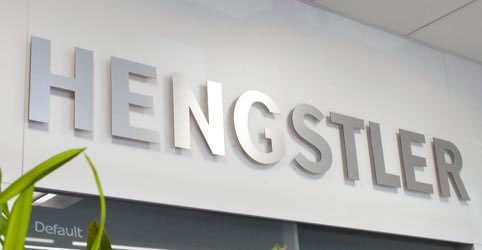
Hengstler products are manufactured to order, in other words, we do not stockpile standard products: they are manufactured after the customer's order has been received and to specification.
In the production cells, each product is manufactured as a complete unit one after the other. The necessary parts are also manufactured to order either in-house or outsourced in accordance with the Kanban system, a Japanese principle that keeps warehouse costs to a minimum. The supplier delivers the required quantity at the appointed time and to the agreed location and at the required, inspected quality level.
The basis of all these activities is the Fortive Business System, referred to in-house simply as FBS. The system itself is also based on Japanese principles – in essence it was created at Toyota and developed within the Danaher Group for our purposes and is also implemented in Fortive.
FBS is a management system that strives for improvements in quality, delivery reliability, cost structures and growth based on customer wishes.
To this end, FBS provides effective organisational and planning tools to involve our employees in achieving our business targets.
Tools of this kind are, for example, the pyramid-shaped target agreements, standards as aids to order-specific cell production, kaizen to ensure continual improvement of all processes and kanban as the link between external suppliers and manufacturers, for example.
Not only does Hengstler intensively and regularly train its own employees in all aspects of FBS, we have also taken on a leading role in training employees from other Fortive companies.
For Hengstler GmbH, environmentally aware management of the enterprise is a fundamental precondition for a successful future for the company as a whole.
Compliance with applicable legislation and regulations is an obligation that has a high priority in the management of our company. We undertake to apply all the environmental legislation that has a bearing on us.
We strive to design all our products and production processes through to final disposal in an environmentally responsible manner, i.e. make the best use of energy and not waste any, minimise residues, waste, emissions and waste water that might be a burden on the environment by means of appropriate technical and organisational measures. In order to give our employees the opportunity to work in clean, environmentally friendly surroundings, the hazardous substances that are essential for our work are minimised and all our staff are trained in safe handling of them. Our employees are encouraged to remedy environmental nuisances independently or to notify the responsible supervisor. Environmental protection requires all staff to take responsible action.
All employees at Hengstler GmbH are involved in our annual summary of our ecological targets, in short or environment programme.
By defining, implementing and regularly monitoring our targets, we can secure the continual improvement process in our enterprise. The particular responsibility of our managers with regard to the dissemination of information, training, motivation and responsible action by employees is initiated by Management and applied by employees in a dedicated manner.
Action is taken to ensure that contractors working on our premises comply with environmental legislation to the same extent we do.
We regularly perform internal audits to monitor the effectiveness of our environmental management system. Where we determine that there is non-conformance compared with the desired state, corrective action is taken and the implementation of that action then checked.
In accordance with Article 33 of the REACH Regulation, suppliers must inform their customers if a product contains an SVHC substance in a concentration greater than 0.1% by mass.
According to the information available to us, a large number of our products contain components in which lead (CAS 7439-92-1) is used as an alloying element, e.g. in brass and aluminum, in a concentration greater than 0.1%.
The inclusion of lead on the SVHC candidate list does not mean a ban, but merely a declaration obligation according to Art. 33 REACH Regulation.
The use of this substance complies with the applicable statutory provisions, provided that the limits of the RoHS directives 2011/65 / EU and 2015/863 / EU are complied with.
When used as intended, there is no danger to health or the environment. Safety instructions are not required.